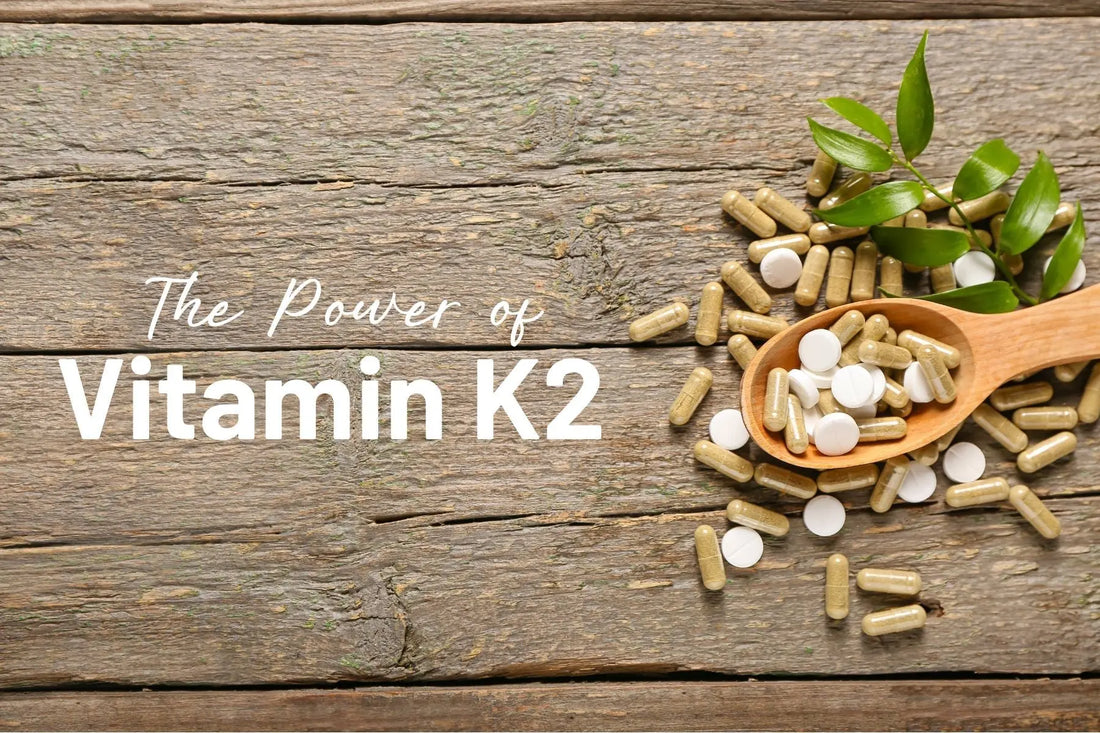
"Acknowledging the Power of Vitamin K2: Why You Need to Add This Supplement to Your Routine"
Share
Understanding Vitamin K2: The Essential Nutrient for Optimal Health
In today's fast-paced world, where stress and environmental toxins are prevalent, finding natural solutions to support your overall well-being is more important than ever. Vitamin K2, a lesser-known but crucial nutrient, plays a significant role in maintaining optimal health. Adding Vitamin K2 to your routine can unlock numerous benefits. This article delves into the importance of Vitamin K2 and explains why it should be an essential part of your supplement regimen.
What is Vitamin K2?
Vitamin K2, also known as menaquinone, is a fat-soluble vitamin critical for various bodily functions. Unlike Vitamin K1, which is predominantly found in green leafy vegetables, Vitamin K2 is primarily synthesized by bacteria in the human gut. This unique production source imparts distinct properties and benefits to Vitamin K2.
The Role of Vitamin K2 in the Body
Vitamin K2 has a profound impact on several aspects of health. Its primary role is to regulate calcium utilization in the body. It helps guide calcium to areas where it is needed most, such as bones and teeth, while preventing its accumulation in areas where it can be harmful, such as arteries. This regulation is vital for:
- Bone Health: Vitamin K2 activates osteocalcin, a protein necessary for binding calcium to the bone matrix, thereby strengthening bones and reducing the risk of osteoporosis and fractures.
- Cardiovascular Health: By preventing calcium deposition in the arteries, Vitamin K2 helps to prevent plaque buildup and arterial hardening, which reduces the risk of heart disease and stroke.
- Brain Function: Emerging research indicates that Vitamin K2 may support cognitive health. It has been linked to improved memory, a reduced risk of dementia, and neuroprotective effects.
- Diabetes Management: Vitamin K2 improves insulin sensitivity and glucose metabolism, making it a valuable supplement for individuals with type 2 diabetes or those at risk of developing the condition.
Vitamin K2 Deficiency and Symptoms
Despite its significance, Vitamin K2 deficiency is relatively common, especially in Western countries. Symptoms of Vitamin K2 deficiency may include:
- Weakened Bones: Increased risk of fractures and bone density loss.
- Cardiovascular Issues: Hardening of the arteries and heightened risk of cardiovascular disease.
- Cognitive Decline: Impaired brain function and increased risk of cognitive disorders.
- Blood Sugar Management: Difficulty managing blood sugar levels and insulin resistance.
Food Sources of Vitamin K2
While Vitamin K2 is produced by gut bacteria, it is also available in certain foods. The best dietary sources include:
- Fermented Foods: Natto, cheese, and certain types of yogurt.
- Organ Meats: Liver and kidney.
- Egg Yolks: Rich in Vitamin K2.
- Grass-Fed Butter and Ghee: Sources of Vitamin K2 from animal fats.
Obtaining sufficient Vitamin K2 from diet alone can be challenging, making supplementation a practical option.
Choosing the Right Vitamin K2 Supplement
When selecting a Vitamin K2 supplement, prioritize high-quality products containing MK-7, the most bioavailable form of Vitamin K2. MK-7 is more effectively absorbed and utilized by the body compared to other forms such as MK-4. Additionally, consider supplements that combine Vitamin K2 with Vitamin D3, as these nutrients work synergistically to enhance bone and cardiovascular health.
How to Incorporate Vitamin K2 into Your Routine
Integrating Vitamin K2 into your daily routine is straightforward. Most experts recommend taking Vitamin K2 with a meal that includes healthy fats, as this enhances its absorption. The typical dosage ranges from 45 to 180 micrograms per day. However, consulting with a healthcare professional is advisable to determine the optimal dosage for your specific needs.
Potential Side Effects and Precautions
Vitamin K2 is generally well-tolerated, with serious side effects being rare. Nonetheless, individuals taking blood-thinning medications, such as warfarin, should consult their healthcare provider before starting Vitamin K2 supplementation, as it may interact with the medication and affect its effectiveness. Additionally, those with certain health conditions should seek medical advice to avoid any adverse interactions.
The Science Behind Vitamin K2
The scientific research on Vitamin K2 is extensive and continues to expand. Studies have demonstrated its benefits for bone health, cardiovascular protection, and more. Key research highlights include:
- Bone Health: Research shows that Vitamin K2 enhances bone mineral density and reduces the incidence of fractures.
- Cardiovascular Health: Studies have linked Vitamin K2 to reduced arterial stiffness and lower risk of cardiovascular diseases.
- Neurological Benefits: Emerging evidence suggests that Vitamin K2 may play a role in brain health and cognitive function.
- Metabolic Effects: Evidence supports Vitamin K2’s role in improving insulin sensitivity and metabolic health.
As research advances, the evidence supporting Vitamin K2 as a valuable component of health and wellness regimens continues to grow.
Conclusion: Unlocking the Power of Vitamin K2
Vitamin K2 is a potent nutrient essential for overall health and well-being. Incorporating it into your daily routine can lead to benefits such as stronger bones, a healthier heart, improved brain function, and better blood sugar management.
Mother Earth Natural Health offers personalized recommendations to help you find the optimal Vitamin K2 supplement for your needs. Contact us today to learn more and start harnessing the transformative potential of Vitamin K2.
